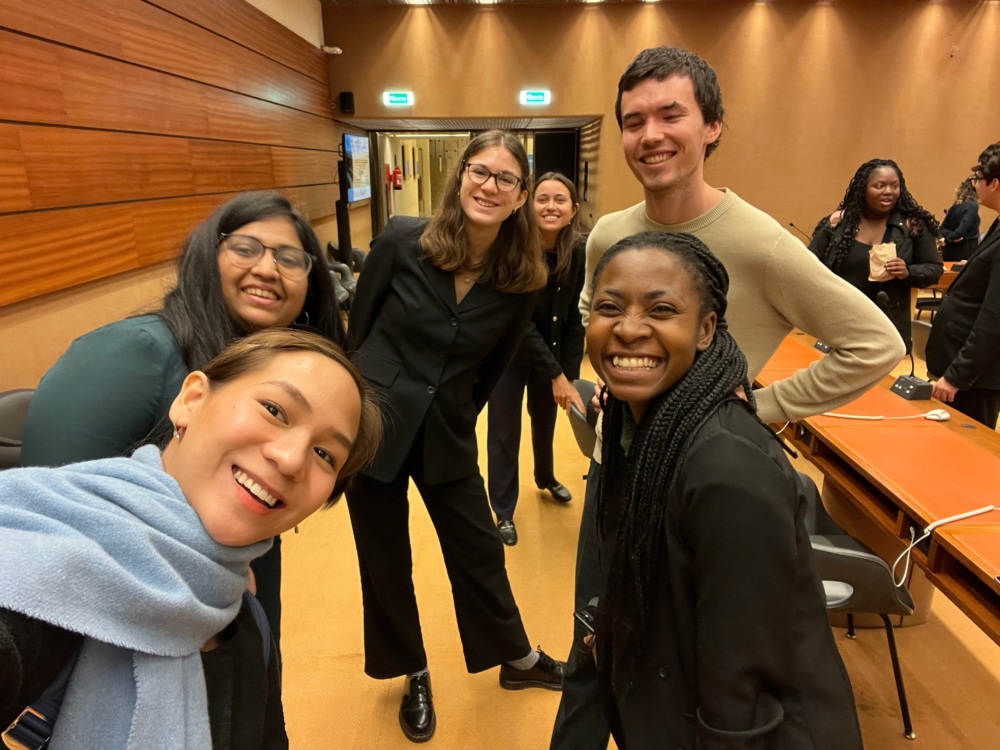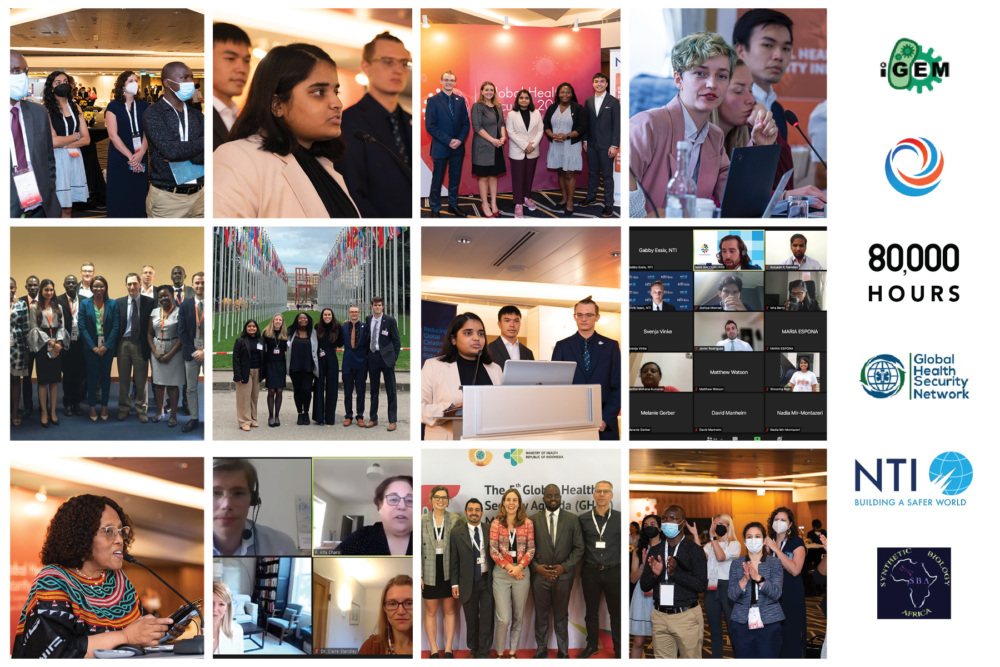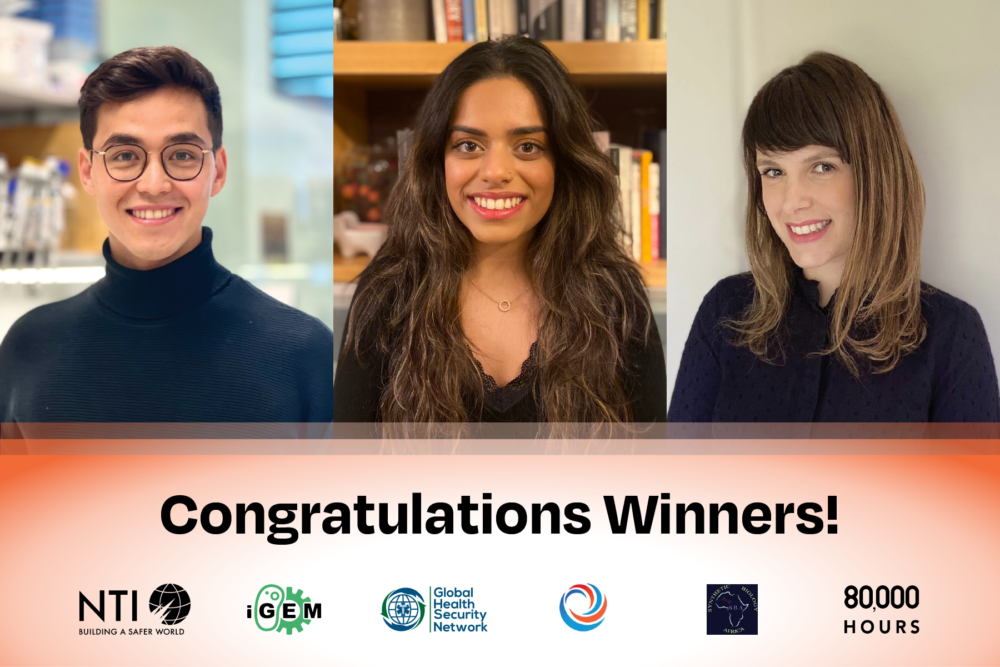
Apply for the 2024 NTI | bio Next Generation Biosecurity Delegation
NTI | bio will bring a 2024 Next Generation Biosecurity Delegation of early-career professionals to the Biological Weapons Convention (BWC) meetings from August 19 – 23.
The seventh annual Next Generation for Biosecurity Competition is now open. NTI | bio, along with the Next Generation for Global Health Security (GHS) Network (NextGen), the iGEM Foundation, 80,000 Hours, SynBio Africa, and the Global Health Security Network (GHSN), hosts this competition to provide a platform for the next generation of global leaders in biosecurity to produce and present original research to the wider biosecurity community.
Applicants for the 2023 competition should design a policy proposal that promotes biosecurity-by-design as a way to bolster emerging bioeconomies. Competition judges seek innovative and creative papers focused on safeguarding science and technology development against misuse by promoting responsible innovation in countries with emerging bioeconomies. The full prompt is found below.
Winners of the Biosecurity Competition will be awarded the following:
Rapid advances in biotechnology and bioscience have led to tremendous economic growth. The bioeconomy – economic activity involving biological material and biotechnology in the production of goods, services, and energy – impacts multiple sectors in addition to health and medicine. Investment and growth of a bio-based economy could help combat issues such as climate change, food security, and environmental sustainability. Growing the bioeconomy could spur the creation of new jobs and industries, as well as lead to the development of new drugs and diagnostics. Some estimates place the direct impact of the bioeconomy at up to $4 trillion per year worldwide over the next decade. [i]
Although advances in the life sciences hold tremendous promise for improving human health and planetary well-being and stimulating bioeconomic growth, they are not without risk. These same advances are also increasing the risk that the tools of modern bioscience and biotechnology could be deliberately exploited or accidentally misused, with the potential to cause a high-consequence biological event. Technological advances such as lower-cost DNA synthesis and democratized access to gene editing tools have made it possible for a broader array of actors to manipulate biological agents and living systems. [ii] These advances outpace the ability of national governments and the international community provide effective oversight, creating consequential gaps in biosecurity and biosafety practices around the world. [iii] Increased risks of the deliberate misuse of the tools of bioscience and biotechnology pose a threat to the international norms outlined in the Biological Weapons Convention (BWC), which is intended to protect against deliberate bioweapons development and use by state actors. When looking to overcome these risks, governments and the international community needs to take a “biosecurity-by-design” approach that does not shut down innovation but builds in guardrails that can minimize risk without stifling critical scientific advances. [iv]
Given this background, applicants should tailor their submission to address the following objective:
Design a policy proposal that promotes biosecurity-by-design as a way to bolster emerging bioeconomies. The policy proposal must include how the proposed efforts to safeguard scientific and technical advances in the life sciences contribute to the advancement of international health and security norms, including those set forth in the International Health Regulations (IHR) and Biological Weapons Convention (BWC).
Submissions should strive to include:
-A working definition of “emerging bioeconomy.” Definitions should acknowledge public and private investment in biotechnology development across sectors.
-Background on how investments in biotechnology can support economic growth and development, while also creating new biological risks—both accidental and deliberate. Submissions should:
-Data analysis demonstrating the need to establish safe and secure bioscience research and development best practices across emerging bioeconomies. Submissions should:
-Discussion on the perceived competition between promoting bioeconomic growth while also protecting against the deliberate misuse of biotechnology for malicious purposes. Submissions should:
-A proposal to build biosecurity-by-design in emerging bioeconomies. Submissions should propose policy and/or technical approaches that promote biosecurity-by-design in emerging bioeconomies in a way that stimulates innovation while advancing relevant international norms.
-A conclusion, with a high-level summary of the proposal and how it will strengthen international health and security norms and standards.
For the purposes of this competition, please use the following definitions for biosecurity and dual-use research of concern:
-Teams must submit two PDF documents:
-All submissions must be in English.
-Participants are highly encouraged to consult with at least one expert in the field of biosecurity and/or biosafety, life sciences, or another related field. Consultation with this expert MUST be listed in the references section of the final report.
Submission deadline is MONDAY, SEPTEMBER 11, 2023, at 11:59PM ET. Submissions should be sent to [email protected]. Winners will be announced in November 2023.
Submissions are evaluated through a three-part process:
Participants can find teammates by:
Join our virtual webinar on July 12 at 9:00 am ET for an overview of the 2023 Next Generation for Biosecurity Competition and a discussion moderated by a former winner of the competition with experts on this year’s prompt. Fill out this form to register.
NTI is a nonprofit, nonpartisan global security organization focused on reducing nuclear and biological threats imperiling humanity.
The Next Generation Global Health Security (GHS) Network engages and facilitates contributions by emerging scholars, scientists, and professionals from government and non-governmental institutions to the Global Health Security Agenda (GHSA) and other global health security projects. Through its mission, the Next Generation Global Health Security Network promotes the values of inclusion, collaboration, education, innovation, and participation to approach and overcome the biggest challenges facing the health security fields today.
The iGEM Foundation is an independent, non-profit organization dedicated to the advancement of synthetic biology, education and competition, and the development of an open community and collaboration. This is done by fostering an open, cooperative community and friendly competition. iGEM is unique in our comprehensive and thorough approach to synthetic biology. With our world class safety and security and human practices programs, we lead the field by fostering an environment of mindful and responsible work.
80,000 Hours is a nonprofit which aims to help people pursue careers that effectively tackle the world’s most pressing problems. They’ve spent the last decade conducting research on how to find a fulfilling career that does good. Their career guide aims to share what they’ve learned; plus, they have a job board that lists currently open roles that help you have a high impact, a podcast, and free 1-1 advising calls. Everything they provide is free, forever, and their only aim is to help people find fulfilling, high-impact careers.
Synbio Africa is a forum for researchers, students, citizen scientists, policy makers and the public at large to convene and develop successful pathways for the propagation of synthetic biology technologies, products and services throughout Africa.
The Global Health Security Network (GHSN) is a limited-by-guarantee company, a registered health promotion charity, and a not-for-profit company in Australia, which has also received an Equivalency Determination (ED) within the United States to receive charitable donations. The objectives of GHSN are to: (i) support and disseminate independent, data-driven, policy-relevant research in global health security that results in inclusive and equitable health outcomes, (ii) foster education and mentorship opportunities, and (iii) advocate for the adoption of policies and initiatives that will enhance national, regional, and global health security.
[i] https://crsreports.congress.gov/product/pdf/R/R46881
Sign up for our newsletter to get the latest on nuclear and biological threats.
NTI | bio will bring a 2024 Next Generation Biosecurity Delegation of early-career professionals to the Biological Weapons Convention (BWC) meetings from August 19 – 23.
Gurpreet Dhaliwal, Askar Kleefeldt, and Alexandra Klein have won the seventh annual Next Generation for Biosecurity Competition.
NTI | bio experts contributed to the 9th Biological Weapons Convention Review Conference in Geneva.


